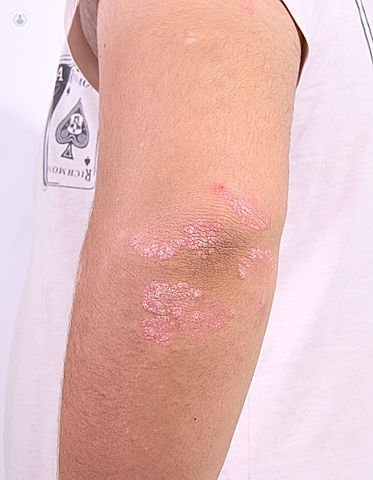Psoriasis, and can manifest itself in your skin
Written by:Psoriasis can occur in different clinical forms, the most common plaque psoriasis. Its exact causes are unknown. At present different therapies have to be selected depending on the severity of the patient and allowing in most cases, the disease control.

Psoriasis, which is
Psoriasis, according to experts in dermatology , is a chronic inflammatory disease associated with outbreaks and can affect the skin and joints (psoriatic arthropathy).
Its appearance is influenced by genetic and environmental factors, with an immunological background responsible for the inflammatory manifestations of the disease.
Psoriasis, how it is presented
The most common presentation of psoriasis skin level is called plaque psoriasis, which is characterized by large raised erythematous areas with silvery scales typical surface.
The distribution is usually bilateral and symmetrical, affecting sites such as the scalp, forearms, knees, lower back ...
Other types of psoriasis
• erythrodermic Psoriasis injuries affect more than 80% of the body surface
• Psoriasis guttata: small plates in the form of generalized drops
• inverted Psoriasis: in which the body folds such as the armpits and English are affected.
• Psoriasis pustular: characterized by the appearance of small sterile pustules that develop into flaking. This form can affect the palms and soles (palmoplantar pustulosis) or be widespread (very rare)
The nail involvement by psoriasis occurs in up to 50% of patients (psoriatic onychopathy)Psoriasis may or may not be itchy, but what is a fact is the declining quality of life of patients with psoriasis.
Impact of Psoriasis
It has been found a higher incidence of comorbidities such as metabolic syndrome (dyslipidemia, diabetes, hypertension and obesity) and Crhon disease in patients with psoriasis compared to the general population.
In erythrodermic psoriasis, large body surface area affected can alter the skin barrier function and necessitate hospitalization of the patient.
Treatment of psoriasis
As general measures all psoriasis patients should maintain good hygiene and apply emollient daily.
For (the most frequent) Mild cases are available topical corticosteroid therapy and derivatives of vitamin D (calcipotriol, tacalcitol) specially designed for this disease. Phototherapy in various forms has proven effective for psoriasis.
In severe cases we have systemic therapies such as methotrexate, cyclosporin and acitretin, and biological therapies, and consolidated, and allow long-term disease control in selected cases. However, there is currently no cure for psoriasis.


